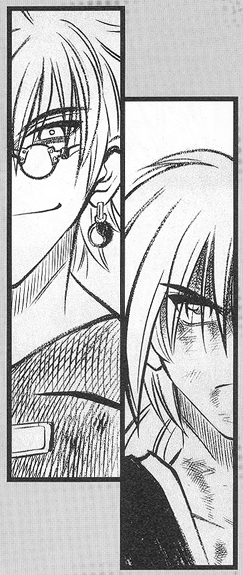- main site -- links --mailing list -- guestbook -- admin
history
(SPOILER WARNING!)
No discussion of the white tiger would be complete without discussing Jinchuu.
“Jinchuu” is usually translated into English as “revenge”, but it’s not the usual Japanese word for revenge (“fukushuu”). It implies a deeper kind of revenge, or vengeance.
“Tenchuu”, the motto of the Isshinshishi (Kenshin’s former group), means that the group takes the justice of Heaven into their own hands. In other words, they are acting as the senders of Heavenly justice. “Jinchuu”, on the other hand, means that even if God did not give His punishment on a person, the group will deliver the deserved punishment anyway. It is the punishment purely of man on another man, earthly justice.
It is Enishi’s belief that Kenshin did not receive the punishment he deserved for killing countless people, including his sister. Therefore, he took it upon himself to deliver that punishment to Kenshin.
To help him orchestrate Jinchuu, he had the help of five other men who have grudges against the Hitokiri Battousai in some way or another. He calls the group the Six Comrades, saying that he is their equal, and that all have fair pickings on the murder of Battousai. Being so bloodthirsty, only Gein notices that Enishi IS the leader, giving all the orders and making all the plans. The other five are only underlings in the general strategy, the ones who will actually make the plan happen.
There are three phases to Enishi’s Jinchuu.
I. Intimidation
Attacks are made to the Akabeko, where Kenshin is known to frequent; the house of the chief of police, because it is known Kenshin has contacts and alliance with the police force; and the Maekawa dojo, where (in the manga) Kaoru teaches part-time and Kenshin once assisted against a troublemaker. As a final touch, a note is left in one of the crime scenes, the two characters for “jinchuu”. It is selected, with the full knowledge of its association with “tenchuu”, as explained above. The mastermind of the attacks obviously has obtained intelligence about Kenshin’s current associations and movements.
Finally, as Kenshin is perplexed and wondering who would hate him so much to go through all this trouble, Enishi himself appears. He warns that he and his henchmen would be back in 10 days.
This stage is not intended as a direct attack, but more of a psychological attack on the target. Its goal was to break down most of the things that he currently held dear, to make him remember the past he was trying to forget.

II. Aggression
This is the actual attack on Kenshin himself and the Kamiya dojo. All five underlings are allowed the chance to have a go at Battousai and try to kill him. But Enishi knew from the start that they would not succeed. Their actual purpose: just to weaken Kenshin sufficiently, so Enishi could defeat him easily short of killing him.
This stage is the physical attack on the target. But it’s purpose was not to kill, just to attack, and weaken the target to accept the full blow of the final emotional attack.
III. Finale
Kenshin should have already won, and with a stunned and defeated mastermind, Jinchuu should not have reached this stage. Unfortunately, fate was on Enishi’s side, and Kujiranami took Kenshin’s final blow from him. Hence, the final piece was put in place.
It was not in Enishi’s constitution to murder a woman, so he did the next best thing. He made Kenshin believe that he killed Kenshin’s replacement for his sister. In so doing, he would make Kenshin feel the agony of seeing his loved one die. He would make him feel what he felt when he saw his sister die.
This is the final psychological blow that would break his brother-in-law, plunging him to depression and a slow death. This stage is the final emotional hit.
For all intents and purposes, Enishi succeeded in his Jinchuu, on all three stages. There was no solid Plan B after the plans for Jinchuu. He expected to win completely. Of course, Enishi is the antagonist of this story, and he has to lose in the end.
But think about it, and be afraid. He already won.